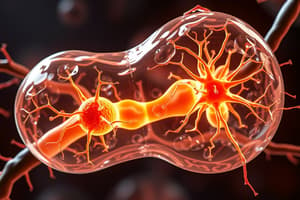Podcast
Questions and Answers
Design a metabolic pathway that could bypass the Krebs cycle in anaerobic conditions. How would it compensate for the lack of oxygen?
Design a metabolic pathway that could bypass the Krebs cycle in anaerobic conditions. How would it compensate for the lack of oxygen?
A potential pathway could involve lactic acid fermentation, which converts pyruvate to lactate, allowing glycolysis to continue. This reaction regenerates NAD⁺, compensating for the lack of oxygen by enabling ATP production without the Krebs cycle.
Design a hypothetical drug that could enhance the efficiency of the electron transport chain. What would its mechanism of action be?
Design a hypothetical drug that could enhance the efficiency of the electron transport chain. What would its mechanism of action be?
The drug could act as a uncoupling agent, facilitating the transfer of protons across the inner mitochondrial membrane. This would enhance ATP synthesis by preventing proton gradient collapse, thereby increasing the efficiency of the electron transport chain.
Evaluate the effectiveness of glycolysis as an energy-producing pathway compared to the full process of cellular respiration.
Evaluate the effectiveness of glycolysis as an energy-producing pathway compared to the full process of cellular respiration.
Glycolysis produces a net gain of 2 ATP per glucose molecule, while full cellular respiration can yield up to 36-38 ATP. Therefore, glycolysis is less effective in terms of total energy output compared to the complete oxidation of glucose.
Assess the importance of NAD⁺ in the process of glycolysis and overall cellular respiration. What would happen if NAD⁺ were depleted?
Assess the importance of NAD⁺ in the process of glycolysis and overall cellular respiration. What would happen if NAD⁺ were depleted?
Evaluate the impact of cyanide poisoning on the process of cellular respiration. Why is this poison so deadly?
Evaluate the impact of cyanide poisoning on the process of cellular respiration. Why is this poison so deadly?
Flashcards are hidden until you start studying
Study Notes
Bypassing the Krebs Cycle
- Anaerobic conditions lack oxygen, essential for the electron transport chain and oxidative phosphorylation.
- A bypass pathway can utilize fermentation, converting pyruvate to lactate or ethanol.
- Lactate fermentation regenerates NAD+, crucial for glycolysis continuation.
- Ethanol fermentation also regenerates NAD+, but produces less ATP.
Enhancing the Electron Transport Chain
- A hypothetical drug could enhance the electron transport chain by:
- Increasing the efficiency of electron transfer.
- Reducing leakage of electrons, minimizing reactive oxygen species formation.
- Promoting proton pumping across the inner mitochondrial membrane, increasing the proton gradient.
Glycolysis vs Cellular Respiration
- Glycolysis yields 2 ATP molecules per glucose, a small amount compared to the 36-38 ATP from full respiration.
- Glycolysis is anaerobic, allowing for energy production in oxygen-deficient environments.
- Cellular respiration is significantly more efficient, utilizing the Krebs cycle and oxidative phosphorylation for maximal ATP production.
Importance of NAD⁺ in Cellular Respiration
- NAD⁺ is a crucial electron carrier, accepting electrons in glycolysis and the Krebs cycle.
- NADH delivers electrons to the electron transport chain, essential for oxidative phosphorylation.
- Depletion of NAD⁺ would halt glycolysis and the Krebs cycle, severely impacting ATP production.
Cyanide Poisoning and Cellular Respiration
- Cyanide binds to cytochrome c oxidase, the final enzyme in the electron transport chain.
- This binding blocks electron flow, disrupting the proton gradient and ATP production.
- Cyanide poisoning rapidly leads to cellular energy depletion and death.
Studying That Suits You
Use AI to generate personalized quizzes and flashcards to suit your learning preferences.




